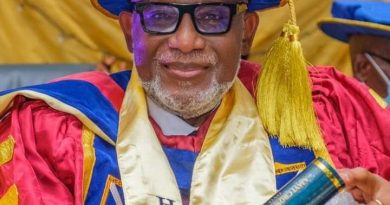NIGERIA: ASKING HOW A NATION LOST HER LUSTER By Debo Ikuesewo-Akinbami
On one of those hot afternoons when scorching sun threatened and tortured commuters in Ibadan, Oyo State, Western Nigeria, the angry sun had angered the driver who, either out of frustration with the poor pricing habit of inconsiderate passengers or the bad shape of Nigerian motorways that often spoil vehicles and caused regular patronage of the mechanics.
The driver looked newly out of one or two of such woes, and was just not ready for words, palpably disinterested in whatever was it that his passengers talked about Nigeria. He had given up!
The discuss had ensued, by face value, between two octogenarians. The oldies reminisced, and regretted (as it seemed) the loss of Nigeria’s golden years – how great the years past were, in their teens. Man and woman, now grannies, talked about how times have changed, about those feats that have now eluded us, robust economy, employment opportunities, hearty patriotism, leadership integrity, dignity of labour, progressive political culture, honesty, hardwork and the reward for it.
I watched them do hearty narrations about their country, they remembered the nation’s rowdy route to independence, her past leaders who, by words and works, provoked love for one’s county and sacrificed just anything to help the people retain a sense of pride and hope in the country they call theirs. Great, yet, strange tales , expectedly, for me. It was hard to imagine that Nigeria had had the beauties they painted of it; all, to a young mind, were fantasies that they seemed, a sort of reverie.
They narrated various versions, poignantly, of the mould, mood and manners of celebration that marked the nation’s attainment of independence in 1960; the high hopes people harboured about a country that was fast burgeoning and becoming Africa’s best, the envy that it was in the comity of nations for her wealth of earth and the worth of her members. Many things they said about Nigeria, the many great deeds of leaders, and stellar strides of the citizens. Crime rate, they said, was low; that graduates found convenient jobs. I was told of the profound prestige of either tool or school.
They remembered how, as teenagers, the government would give school children variety of gifts on the day of independence commemoration, gesture to warm young hearts and impress on them enduring love and faith in their country; and on reaching homes with flags and gifts, parents were proud and reassured of a nation worth bequeathing to younger generations. I could see the sheen of those years in their eyes. I wished the country hadn’t changed from the golden past of their paint.
At a point, I could not hide that I was enthralled and emotive. I could not readily contribute to the issues; they were not beyond me, they were before me, so I was desperate for lessons. I turned my whole to it. They imagined but could not comprehend why and how their Nigeria, our Nigeria, became weak and poor on plural fronts. They were pained by the sad realities and concluded: Those were years when good leaders led the country, when politicians cared about the public well-being. The good ones have gone! They ended it. We parted, each with a share of the worries.
That was not the first time I felt pains about Nigeria. We have always received accounts of Nigeria’s great past. Tellings about how a vendor would leave his wares by the road side with a price tag and returned to meet them intact or meet the monies should a buyer had picked them while the owner was away. Account of how an undergraduate had whole chicken for meal on any Nigerian university campus. We were told tales of the high premium government placed on education, when education was both free and compulsory; of how questions about a Nigerian’s state of origin was nonexistent as boys from various ethnic backgrounds mixed freely on the streets of Lagos with everyone answering Omo Eko ( Lagos boy).
Things have changed. A nation with so much prospects and promise at formative derailed at noon. It became careless with both leadership and fellowship issues. It reversed from fine ideological convictions to crude political culture. A supposedly buoyant economy became sickly as a result of poor policies and acts of perfidious public servants. Our diversity, a putative strength, turned device for divide in the hands of unscrupulous political actors. Corruption crept into all rooms and controls it. Leeches found their way to our thrones by inducing our weak minds with loots that we laud and share. Criminality become the order of the day. We lost it, and loosing it still.
I had worried and wondered the propriety of Chinua Achebe’s last memoir, ‘There was a Country’ which, for me, reopened already -healing wounds. I consider it largely as unessesary prose and literary disservice to a country itching to forget her failings and forge afresh ahead, yet, the book has the capacity to influence reading, thinking leaders with conscience. The book reminds us of the saner society that Nigeria was so that leaders find the scarce sobriety and possibly see the need to retrace steps and renew communal faith in Nigeria as a people, to be more conscious and concerned about leadership questions, to give the country, as followers, the kind of love we expect leaders to give it.
Today, again, gives our country another chance to take honest stock. Though we are wont to revel in the mood of independence, we should not do this falsely. If we must make meaningful progress as a nation and make it a home that it should be for us, we must tell ourselves the hard truths, part of which is that ours is an independence whose age still fails to match its gains.



